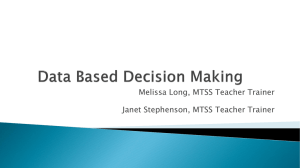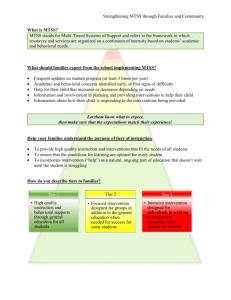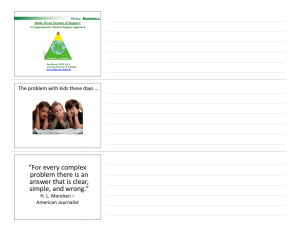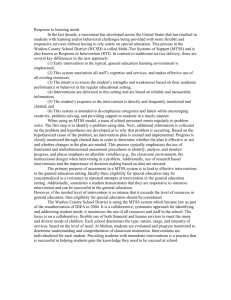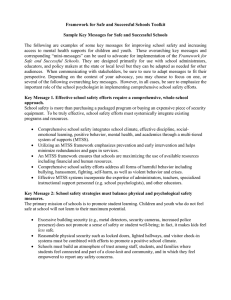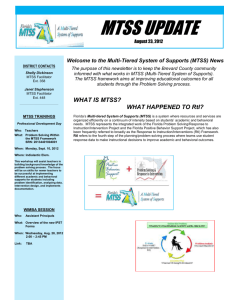Embedding Positive Behavior Support in Teacher Preparation Tim Knoster, EdD
advertisement
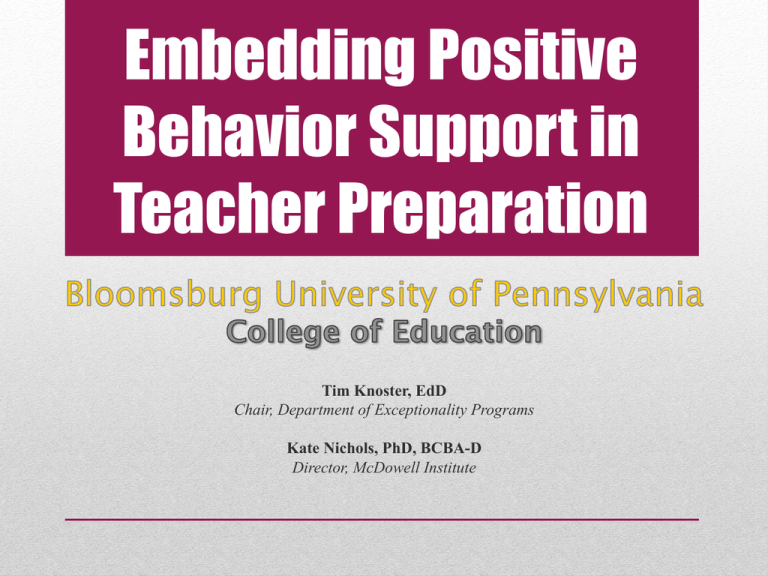
Embedding Positive Behavior Support in Teacher Preparation Tim Knoster, EdD Chair, Department of Exceptionality Programs Kate Nichols, PhD, BCBA-D Director, McDowell Institute Bloomsburg University of PA • Located in Central PA • Offers 54 undergraduate majors, 44 undergraduate minors and 20 graduate programs • 9,201 undergraduate students enrolled during Fall 2012 • 271 education major graduate students enrolled during Fall 2012 • 1,608 undergraduate education majors for 2011-12 • Exceptionality Programs: 461 • Early Childhood & Adolescent Education: 667 • Educational Studies & Secondary Education: 387 McDowell Institute • Established in 2012 by local philanthropist to enhance teacher preparatory programs • Institute Goals include: 1) Improve academic achievement of undergraduate education majors 2) Establish, teach and reinforce standards for professionalism among undergraduate education majors 3) Increase education majors’ knowledge of and practical experience with MTSS 4) Provide outreach services via in-service trainings and workshops to school systems in coordination with Pennsylvania (PA) PBS network MTSS: Tier I Systems • • • • • • • • • • • Outcomes: Academic Achievement & Professionalism Practices Data Student Referral Process for MTSS MTSS Faculty Manual Universal Screening Process Progress Monitoring Database Tier I Team: Core MTSS Training/Research Group • • • • Reinforcement for Promising Educators Gotcha Tickets for Expected Behaviors Advanced Tier I Interventions Posted Behavior Expectation Matrix Integration of PBIS within Course Curricula Student-completed PBIS Modules Student Referral Rates Earned Token Reinforcement Advanced Tier I Supports Progress Monitoring MTSS BOQ MTSS EBP’s Tier I 1. Define & Teach Program Expectations • Consistent Standards for Professionalism • Posted Behavioral Expectations • Examples & Non-examples of Expectations 2. Acknowledgment & Reinforcement • GOTCHA Tickets for Expected Behaviors with Raffle • Promising Educator Certificate & Public Posting 3. Relevant Curriculum & Instruction • Imbedding PBIS Principles within Core Courses • Non-credit PBIS Modules • Symposiums & Practicum 4. Student Progress Monitoring • Attendance Data & Grades • Advisement Data • Faculty Referral Concerning Dispositions Sugai et al., 2000; Horner, Sugai, & Anderson (2008) 5. Brookfield, 1995, 2005; Zeichner & Liston, 1987 Bristol & Sloane, 1974; Kehle et al., 2000; McCoy et al, 1977; Newstrom, McLaughlin, & Sweeney, 1999; Ruth, 1996; Wilkinson, 2003 Advanced Tier I Interventions • Self-reflection Papers • Increased Contact with Advisor/Chairperson • Behavioral Contract 6. Universal Screening • Haberman Score • MAP Works Sugai et al., 2000; Horner, Sugai, & Anderson (2008) Horner, Sugai, & Anderson (2008); Sugai & Horner, 2009; O’Neill & Stephenson, 2012 Lewis-Palmer, Sugai, & Larson, 1999;Turbull et al., 2002; Horner, Sugai, & Anderson (2008); Sugai & Horner, 2009 Horner, Sugai, & Anderson (2008); Sugai & Horner, 2009 MTSS: Tier II Systems Outcomes: Academic Achievement & Professionalism Practices Data • • • • Student referral process for MTSS MTSS manual for faculty Progress Monitoring Database Tier II Team (COE Intervention Protocol) • Tier II Interventions • Additional Training on Professionalism Standards (emphasis on particular rules targeted groups of students are having difficulty with) • Remedial activities to address concepts not mastered in course • Increased progress monitoring • Student Referrals to MTSS • Tier II Supports Progress Monitoring (student performance) • MTSS Evaluation MTSS EBP’s Tier II 1. Tier II Interventions Targeted Skills Instruction Horner, Sugai, & Anderson (2008) 2. Increased Progress Monitoring and Guidance/Advisement Horner, Sugai, & Anderson (2008) Bray, 1985; Brophy, 1984; Glennen & Farren, 1990; Glennen et al., 1996; Holmes, 2000; Nichols, 1986; Shultz, 1989; Spears, 1990 3. Peer-based Supports Budge, 2006; Miller, 2005; Pagan & Edwards• Mentoring Wilson, 2002/03; Thomas & Ward, 2010;Ward, • Peer tutoring Thomas, & Disch, 2009; Ward, Thomas, & Disch, 2010; What Works Clearinghouse, 2012 4. Explicit Expectations for Accountability & Performance Bicard et al., 2012 • Text Messaging to Improve Attendance/Timeliness Bristol & Sloane, 1974; Kehle et al., 2000; • Behavioral Contracting McCoy et al, 1977; Newstrom, McLaughlin, & Sweeney, 1999; Ruth, 1996; Wilkinson, 2003 6. Student Counseling Services Bishop & Walker, 1990; Campbell, 1965; Frank & Kirk, 1975; Vermeersch et al., 2004; Whipple et al., 2003 MTSS: Tier III Systems Outcomes: Academic Achievement & Professionalism Practices Data • • • • Student referral process for MTSS MTSS manual for faculty Progress Monitoring Database Student intervention team (COE Intervention Protocol) • Competing Behavior Pathway (Self-reflection by student) • Tier III interventions (Behavior Contract, CICO, Intensive Faculty/Chairperson Advisement • Individualized, explicit standards for Professionalism targeting deficit areas • Extensive remedial activities to address concepts not mastered in course • Student Referrals to MTSS • Tier III Supports Progress Monitoring (student performance) • Student Grades and Levels of Performance • MTSS Evaluation MTSS EBP’s Tier III 1. Behavioral Contracting with CICO (Hybrid) Bristol & Sloane, 1974; Kehle et al., 2000; McCoy et al, 1977; Newstrom, McLaughlin, & Sweeney, 1999; Ruth, 1996; Wilkinson, 2003 2. Meetings & Intensive Guidance/Advisement 3. Change of Major (when warranted) Bray, 1985; Brophy, 1984; Glennen & Farren, 1990; Glennen et al., 1996; Holmes, 2000; Nichols, 1986; Shultz, 1989; Spears, 1990 Initial Year Actions (2012-13) • Implemented a Multi-tier Systems of Support at Bloomsburg University, College of Ed, Department of Exceptionality initiated during Fall 2012 • Modified MTSS developed by Dept. of Except. Programs to fit contextually within the Early Childhood and Secondary Education Departments • Established PBIS within Higher Ed strand at PA PBS Network Implementers’ Forum • Provided intensive training workshops to alternative school setting to integrate PBIS for secondary age students • Identified research agenda to evaluate impact of MTSS on Bloomsburg undergraduate education majors Year 2 Actions (2013-14) • Roll out MTSS in Early Childhood/Adolescent Education and Educational Services/Secondary Education Departments • Commence research projects to evaluate effectiveness of MTSS • On-going implementation and research planning with MTSS core team • Develop COE-wide MTSS manual and referral process • Initiate completion of PBIS modules assigned to core courses • Establish collaborative relationship across Bloomsburg University to identify need for MTSS (not limited to COE) Year 3 & 4 Actions (2014-15) • Evaluate longitudinal impact of MTSS on student retention and graduation • Completion of PBIS modules associated with 5 core courses completed by all education undergraduate majors • Establish collaborative relationship with higher education institutions seeking to implement MTSS • Sustain MTSS with fidelity within College of Education • Integrate MTSS into graduate education programs
